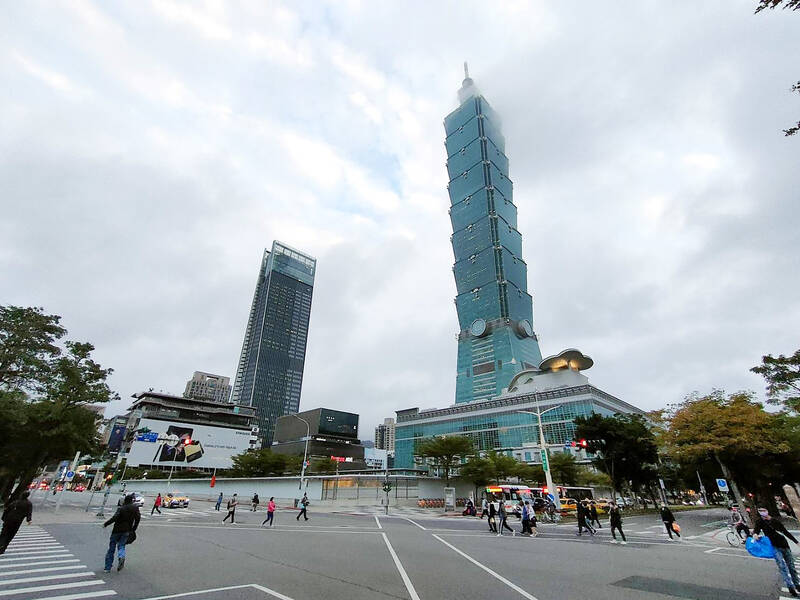Taipei 101, in the capital’s prime Xinyi District (信義), won the “King of the Land” title for the 10th straight year, with the value of office space in the skyscraper rising to NT$6.55 million (US$213,286) per ping (3.3m2), the Taipei City Government said.
The adjustments means the value of the landmark building is NT$1.98 million per square meter for taxation purposes next year.
Homeowners must pay land taxes annually, but land value increment taxes only upon selling their houses.

Photo: Hsu Yi-ping, Taipei Times
The Shin Kong Tower near Taipei Railway Station in Zhongheng District (中正) ranked second, at NT$6.29 million per ping, it said.
The city government said the citywide assessment was based on a survey of property transactions from Sept. 2 last year to Sept. 1.
During the period, the number of real-estate deals fell 3.6 percent to 29,672, but property prices gained 5.81 percent, it said.
The trend is attributable to building material price increases and a slowdown in GDP growth, it added.
Robust demand for upscale office space in central business districts pushed up the value of Taipei 101 offices, as well as those in high-rise buildings nearby, it said.
Property prices in all of the city’s 12 districts picked up, at 3.71 percent on average, while 2.76 percent of the area assessed posted flat prices and 0.27 percent saw price corrections, it said.
Nangang District (南港) reported the fastest price growth, at 4.56 percent, thanks to improving infrastructure facilities linked to the city government’s Eastern District Gateway Project (東區門戶計劃), it said.
Neihu District (內湖) was second, posting a 4.2 percent uptick on the back of housing demand, it said.
Wanhua District (萬華) registered the smallest increase, at 3.02 percent, as commercial activity in the Ximending (西門町) area took a hard hit from the COVID-19 pandemic, it said.
Taipei Department of Land Administration Commissioner Chang Chih-hsiang (張治祥) said land value increment taxes do not affect people who do not engage in property transactions.

NEW IDENTITY: Known for its software, India has expanded into hardware, with its semiconductor industry growing from US$38bn in 2023 to US$45bn to US$50bn India on Saturday inaugurated its first semiconductor assembly and test facility, a milestone in the government’s push to reduce dependence on foreign chipmakers and stake a claim in a sector dominated by China. Indian Prime Minister Narendra Modi opened US firm Micron Technology Inc’s semiconductor assembly, test and packaging unit in his home state of Gujarat, hailing the “dawn of a new era” for India’s technology ambitions. “When young Indians look back in the future, they will see this decade as the turning point in our tech future,” Modi told the event, which was broadcast on his YouTube channel. The plant would convert

‘SEISMIC SHIFT’: The researcher forecast there would be about 1.1 billion mobile shipments this year, down from 1.26 billion the prior year and erasing years of gains The global smartphone market is expected to contract 12.9 percent this year due to the unprecedented memorychip shortage, marking “a crisis like no other,” researcher International Data Corp (IDC) said. The new forecast, a dramatic revision down from earlier estimates, gives the latest accounting of the ongoing memory crunch that is affecting every corner of the electronics industry. The demand for advanced memory to power artificial intelligence (AI) tasks has drained global supply until well into next year and jeopardizes the business model of many smartphone makers. IDC forecast about 1.1 billion mobile shipments this year, down from 1.26 billion the prior

People stand in a Pokemon store in Tokyo on Thursday. One of the world highest-grossing franchises is celebrated its 30th anniversary yesterday.

Zimbabwe’s ban on raw lithium exports is forcing Chinese miners to rethink their strategy, speeding up plans to process the metal locally instead of shipping it to China’s vast rechargeable battery industry. The country is Africa’s largest lithium producer and has one of the world’s largest reserves, according to the US Geological Survey (USGS). Zimbabwe already banned the export of lithium ore in 2022 and last year announced it would halt exports of lithium concentrates from January next year. However, on Wednesday it imposed the ban with immediate effect, leaving unclear what the lithium mining sector would do in the